Psychology Exploration: Parental Praise Effects on Child Outcomes
VerifiedAdded on 2023/04/20
|14
|3484
|168
Essay
AI Summary
This psychology essay examines the impact of parental praise on children's academic performance and psychological well-being. It investigates the effects of both overpraising and underpraising, as perceived by both parents and children. The study, involving parents and children completing questionnaires, reveals that accurate praise correlates with higher GPAs and lower depression levels, while overstated or understated praise is linked to poorer academic outcomes and increased emotional distress. The research emphasizes the importance of praise accuracy in fostering positive child development and highlights the complex interplay between parental perceptions, children's interpretations, and their subsequent academic and emotional states. The findings suggest that praise should be delivered thoughtfully and realistically to maximize its benefits for children's overall well-being and academic success.
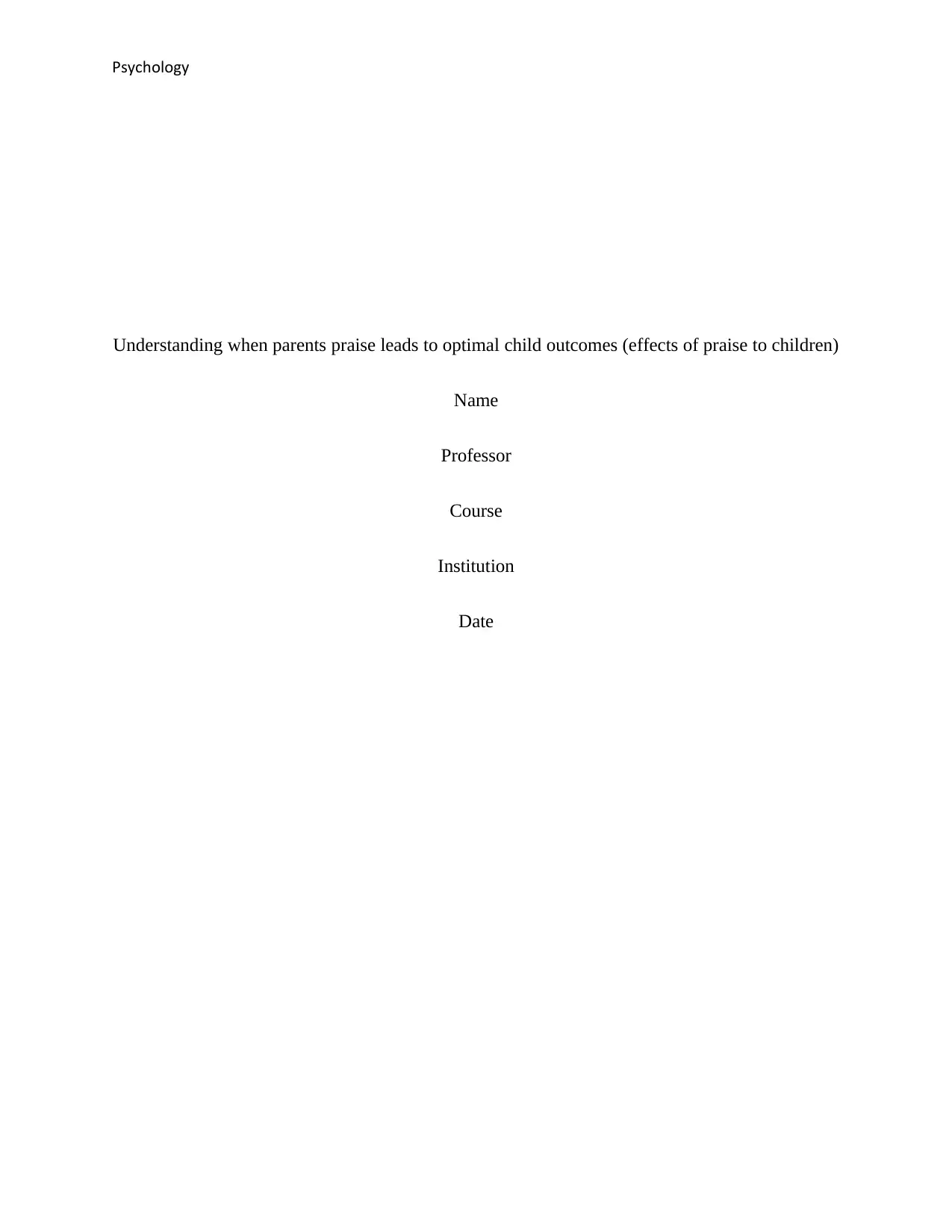
Psychology
Understanding when parents praise leads to optimal child outcomes (effects of praise to children)
Name
Professor
Course
Institution
Date
Understanding when parents praise leads to optimal child outcomes (effects of praise to children)
Name
Professor
Course
Institution
Date
Paraphrase This Document
Need a fresh take? Get an instant paraphrase of this document with our AI Paraphraser
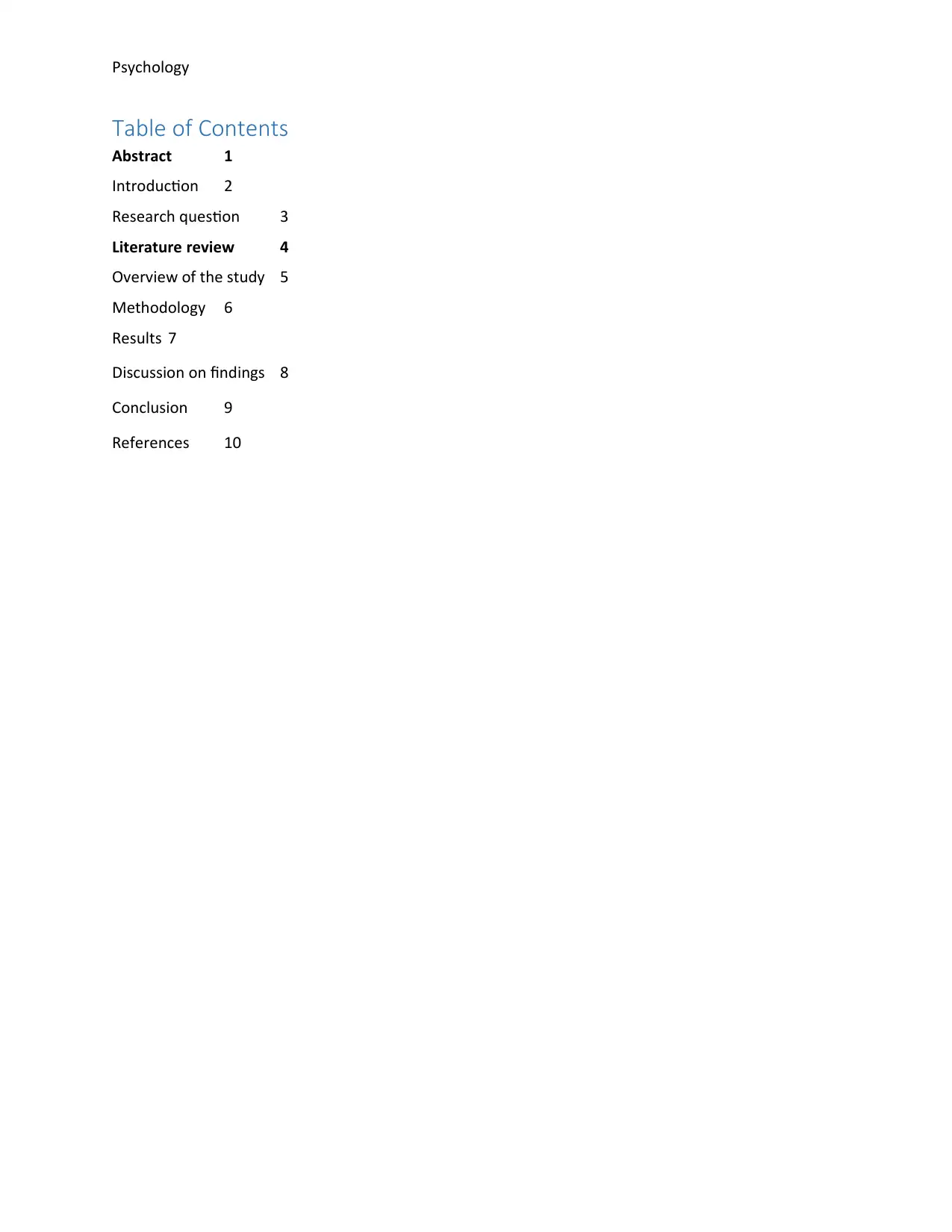
Psychology
Table of Contents
Abstract 1
Introduction 2
Research question 3
Literature review 4
Overview of the study 5
Methodology 6
Results 7
Discussion on findings 8
Conclusion 9
References 10
Table of Contents
Abstract 1
Introduction 2
Research question 3
Literature review 4
Overview of the study 5
Methodology 6
Results 7
Discussion on findings 8
Conclusion 9
References 10
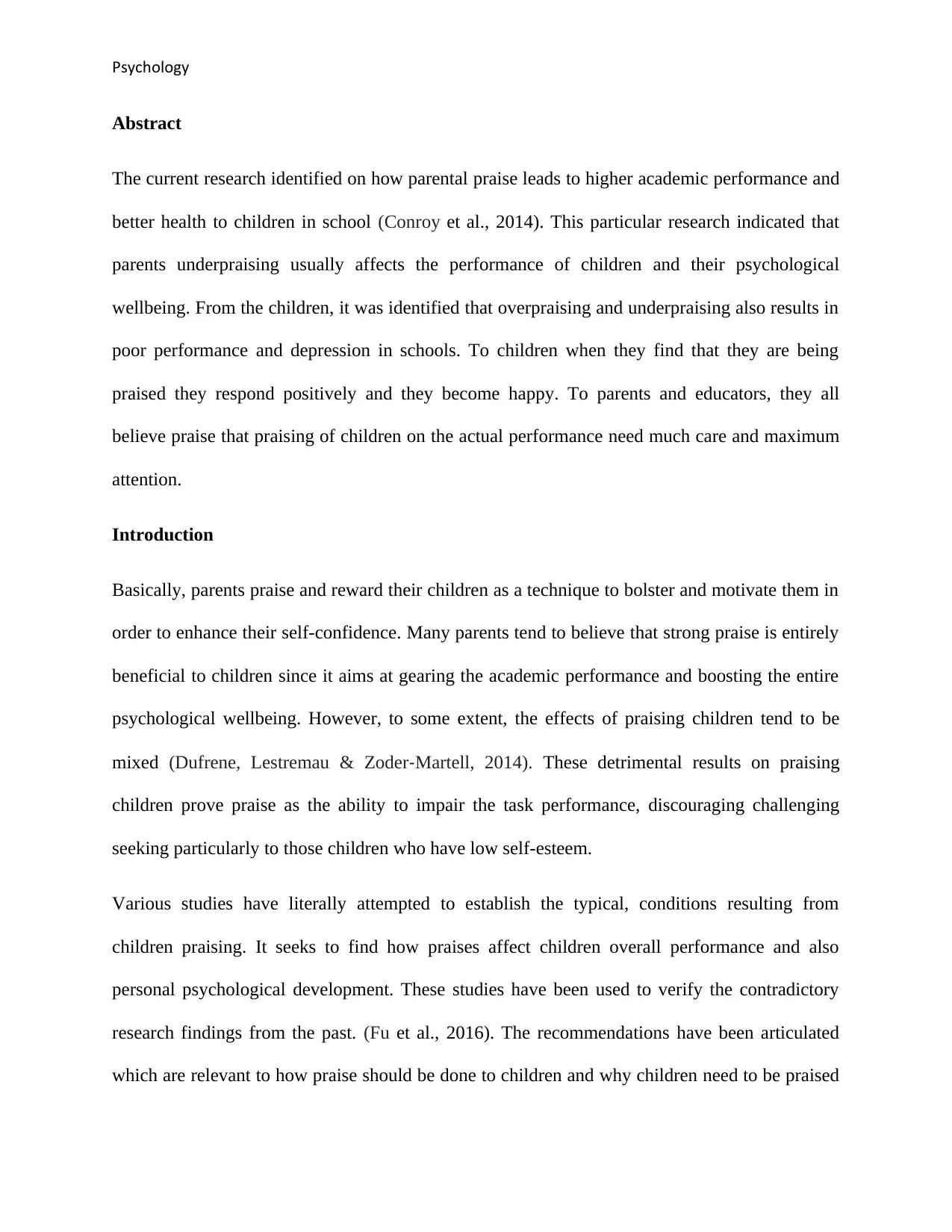
Psychology
Abstract
The current research identified on how parental praise leads to higher academic performance and
better health to children in school (Conroy et al., 2014). This particular research indicated that
parents underpraising usually affects the performance of children and their psychological
wellbeing. From the children, it was identified that overpraising and underpraising also results in
poor performance and depression in schools. To children when they find that they are being
praised they respond positively and they become happy. To parents and educators, they all
believe praise that praising of children on the actual performance need much care and maximum
attention.
Introduction
Basically, parents praise and reward their children as a technique to bolster and motivate them in
order to enhance their self-confidence. Many parents tend to believe that strong praise is entirely
beneficial to children since it aims at gearing the academic performance and boosting the entire
psychological wellbeing. However, to some extent, the effects of praising children tend to be
mixed (Dufrene, Lestremau & Zoder‐Martell, 2014). These detrimental results on praising
children prove praise as the ability to impair the task performance, discouraging challenging
seeking particularly to those children who have low self-esteem.
Various studies have literally attempted to establish the typical, conditions resulting from
children praising. It seeks to find how praises affect children overall performance and also
personal psychological development. These studies have been used to verify the contradictory
research findings from the past. (Fu et al., 2016). The recommendations have been articulated
which are relevant to how praise should be done to children and why children need to be praised
Abstract
The current research identified on how parental praise leads to higher academic performance and
better health to children in school (Conroy et al., 2014). This particular research indicated that
parents underpraising usually affects the performance of children and their psychological
wellbeing. From the children, it was identified that overpraising and underpraising also results in
poor performance and depression in schools. To children when they find that they are being
praised they respond positively and they become happy. To parents and educators, they all
believe praise that praising of children on the actual performance need much care and maximum
attention.
Introduction
Basically, parents praise and reward their children as a technique to bolster and motivate them in
order to enhance their self-confidence. Many parents tend to believe that strong praise is entirely
beneficial to children since it aims at gearing the academic performance and boosting the entire
psychological wellbeing. However, to some extent, the effects of praising children tend to be
mixed (Dufrene, Lestremau & Zoder‐Martell, 2014). These detrimental results on praising
children prove praise as the ability to impair the task performance, discouraging challenging
seeking particularly to those children who have low self-esteem.
Various studies have literally attempted to establish the typical, conditions resulting from
children praising. It seeks to find how praises affect children overall performance and also
personal psychological development. These studies have been used to verify the contradictory
research findings from the past. (Fu et al., 2016). The recommendations have been articulated
which are relevant to how praise should be done to children and why children need to be praised
⊘ This is a preview!⊘
Do you want full access?
Subscribe today to unlock all pages.

Trusted by 1+ million students worldwide
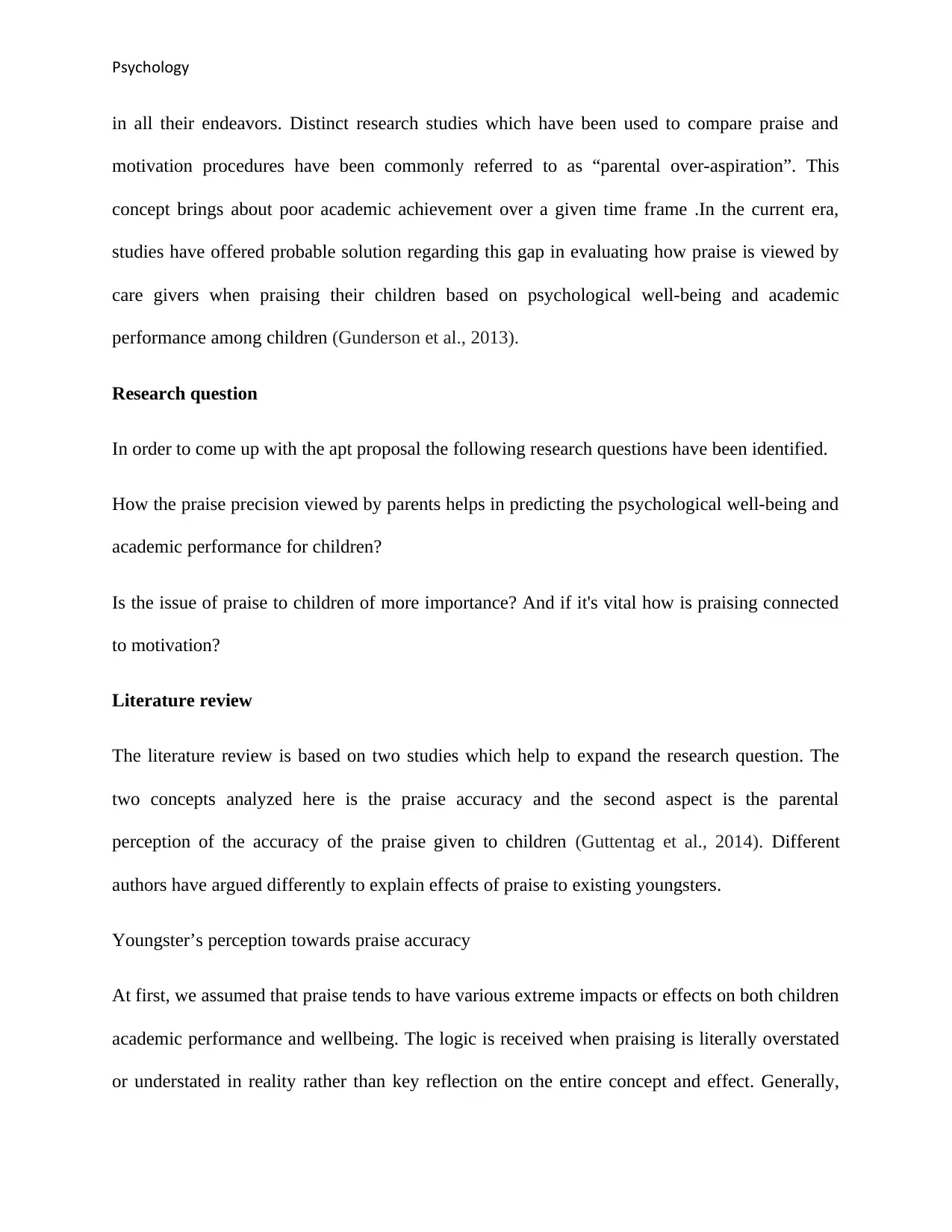
Psychology
in all their endeavors. Distinct research studies which have been used to compare praise and
motivation procedures have been commonly referred to as “parental over-aspiration”. This
concept brings about poor academic achievement over a given time frame .In the current era,
studies have offered probable solution regarding this gap in evaluating how praise is viewed by
care givers when praising their children based on psychological well-being and academic
performance among children (Gunderson et al., 2013).
Research question
In order to come up with the apt proposal the following research questions have been identified.
How the praise precision viewed by parents helps in predicting the psychological well-being and
academic performance for children?
Is the issue of praise to children of more importance? And if it's vital how is praising connected
to motivation?
Literature review
The literature review is based on two studies which help to expand the research question. The
two concepts analyzed here is the praise accuracy and the second aspect is the parental
perception of the accuracy of the praise given to children (Guttentag et al., 2014). Different
authors have argued differently to explain effects of praise to existing youngsters.
Youngster’s perception towards praise accuracy
At first, we assumed that praise tends to have various extreme impacts or effects on both children
academic performance and wellbeing. The logic is received when praising is literally overstated
or understated in reality rather than key reflection on the entire concept and effect. Generally,
in all their endeavors. Distinct research studies which have been used to compare praise and
motivation procedures have been commonly referred to as “parental over-aspiration”. This
concept brings about poor academic achievement over a given time frame .In the current era,
studies have offered probable solution regarding this gap in evaluating how praise is viewed by
care givers when praising their children based on psychological well-being and academic
performance among children (Gunderson et al., 2013).
Research question
In order to come up with the apt proposal the following research questions have been identified.
How the praise precision viewed by parents helps in predicting the psychological well-being and
academic performance for children?
Is the issue of praise to children of more importance? And if it's vital how is praising connected
to motivation?
Literature review
The literature review is based on two studies which help to expand the research question. The
two concepts analyzed here is the praise accuracy and the second aspect is the parental
perception of the accuracy of the praise given to children (Guttentag et al., 2014). Different
authors have argued differently to explain effects of praise to existing youngsters.
Youngster’s perception towards praise accuracy
At first, we assumed that praise tends to have various extreme impacts or effects on both children
academic performance and wellbeing. The logic is received when praising is literally overstated
or understated in reality rather than key reflection on the entire concept and effect. Generally,
Paraphrase This Document
Need a fresh take? Get an instant paraphrase of this document with our AI Paraphraser
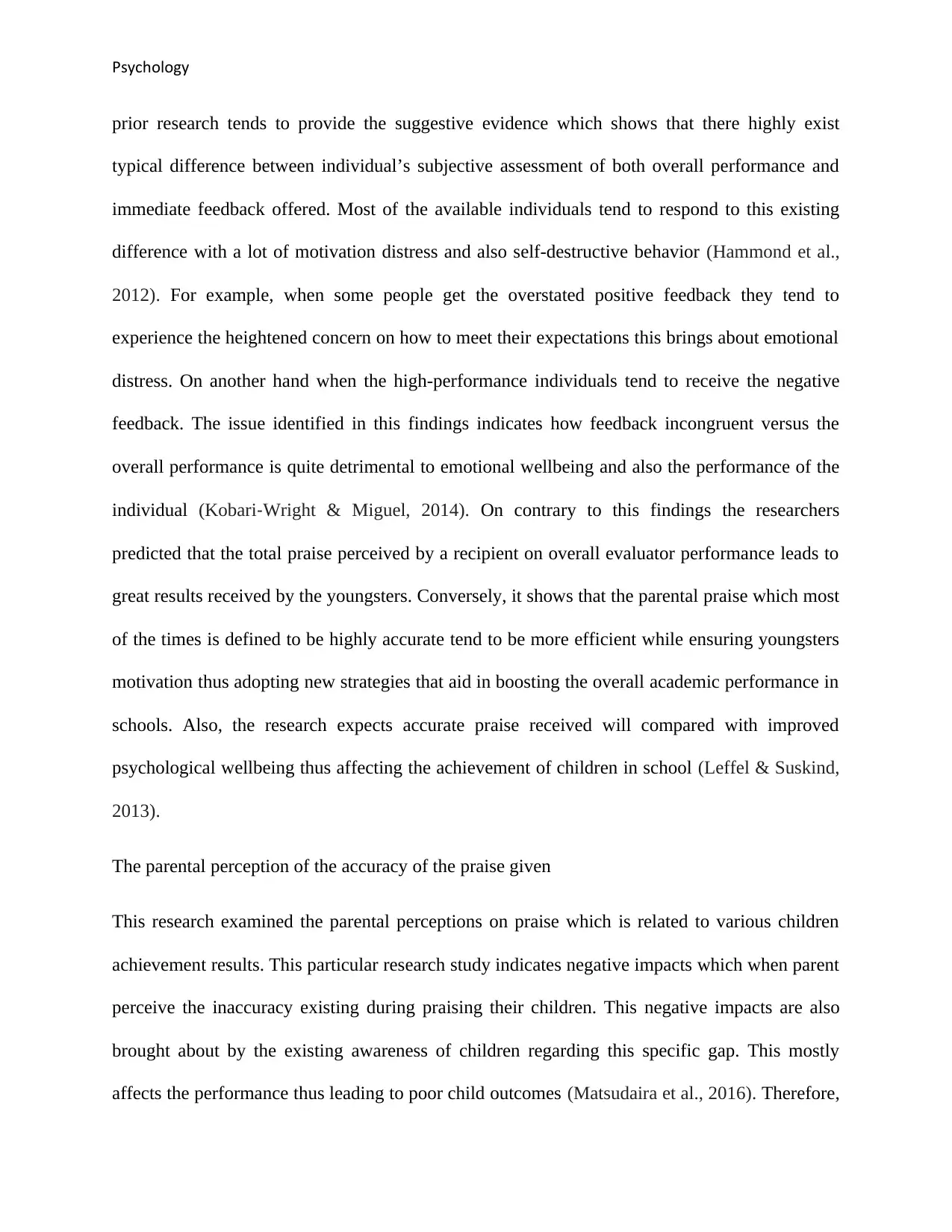
Psychology
prior research tends to provide the suggestive evidence which shows that there highly exist
typical difference between individual’s subjective assessment of both overall performance and
immediate feedback offered. Most of the available individuals tend to respond to this existing
difference with a lot of motivation distress and also self-destructive behavior (Hammond et al.,
2012). For example, when some people get the overstated positive feedback they tend to
experience the heightened concern on how to meet their expectations this brings about emotional
distress. On another hand when the high-performance individuals tend to receive the negative
feedback. The issue identified in this findings indicates how feedback incongruent versus the
overall performance is quite detrimental to emotional wellbeing and also the performance of the
individual (Kobari‐Wright & Miguel, 2014). On contrary to this findings the researchers
predicted that the total praise perceived by a recipient on overall evaluator performance leads to
great results received by the youngsters. Conversely, it shows that the parental praise which most
of the times is defined to be highly accurate tend to be more efficient while ensuring youngsters
motivation thus adopting new strategies that aid in boosting the overall academic performance in
schools. Also, the research expects accurate praise received will compared with improved
psychological wellbeing thus affecting the achievement of children in school (Leffel & Suskind,
2013).
The parental perception of the accuracy of the praise given
This research examined the parental perceptions on praise which is related to various children
achievement results. This particular research study indicates negative impacts which when parent
perceive the inaccuracy existing during praising their children. This negative impacts are also
brought about by the existing awareness of children regarding this specific gap. This mostly
affects the performance thus leading to poor child outcomes (Matsudaira et al., 2016). Therefore,
prior research tends to provide the suggestive evidence which shows that there highly exist
typical difference between individual’s subjective assessment of both overall performance and
immediate feedback offered. Most of the available individuals tend to respond to this existing
difference with a lot of motivation distress and also self-destructive behavior (Hammond et al.,
2012). For example, when some people get the overstated positive feedback they tend to
experience the heightened concern on how to meet their expectations this brings about emotional
distress. On another hand when the high-performance individuals tend to receive the negative
feedback. The issue identified in this findings indicates how feedback incongruent versus the
overall performance is quite detrimental to emotional wellbeing and also the performance of the
individual (Kobari‐Wright & Miguel, 2014). On contrary to this findings the researchers
predicted that the total praise perceived by a recipient on overall evaluator performance leads to
great results received by the youngsters. Conversely, it shows that the parental praise which most
of the times is defined to be highly accurate tend to be more efficient while ensuring youngsters
motivation thus adopting new strategies that aid in boosting the overall academic performance in
schools. Also, the research expects accurate praise received will compared with improved
psychological wellbeing thus affecting the achievement of children in school (Leffel & Suskind,
2013).
The parental perception of the accuracy of the praise given
This research examined the parental perceptions on praise which is related to various children
achievement results. This particular research study indicates negative impacts which when parent
perceive the inaccuracy existing during praising their children. This negative impacts are also
brought about by the existing awareness of children regarding this specific gap. This mostly
affects the performance thus leading to poor child outcomes (Matsudaira et al., 2016). Therefore,
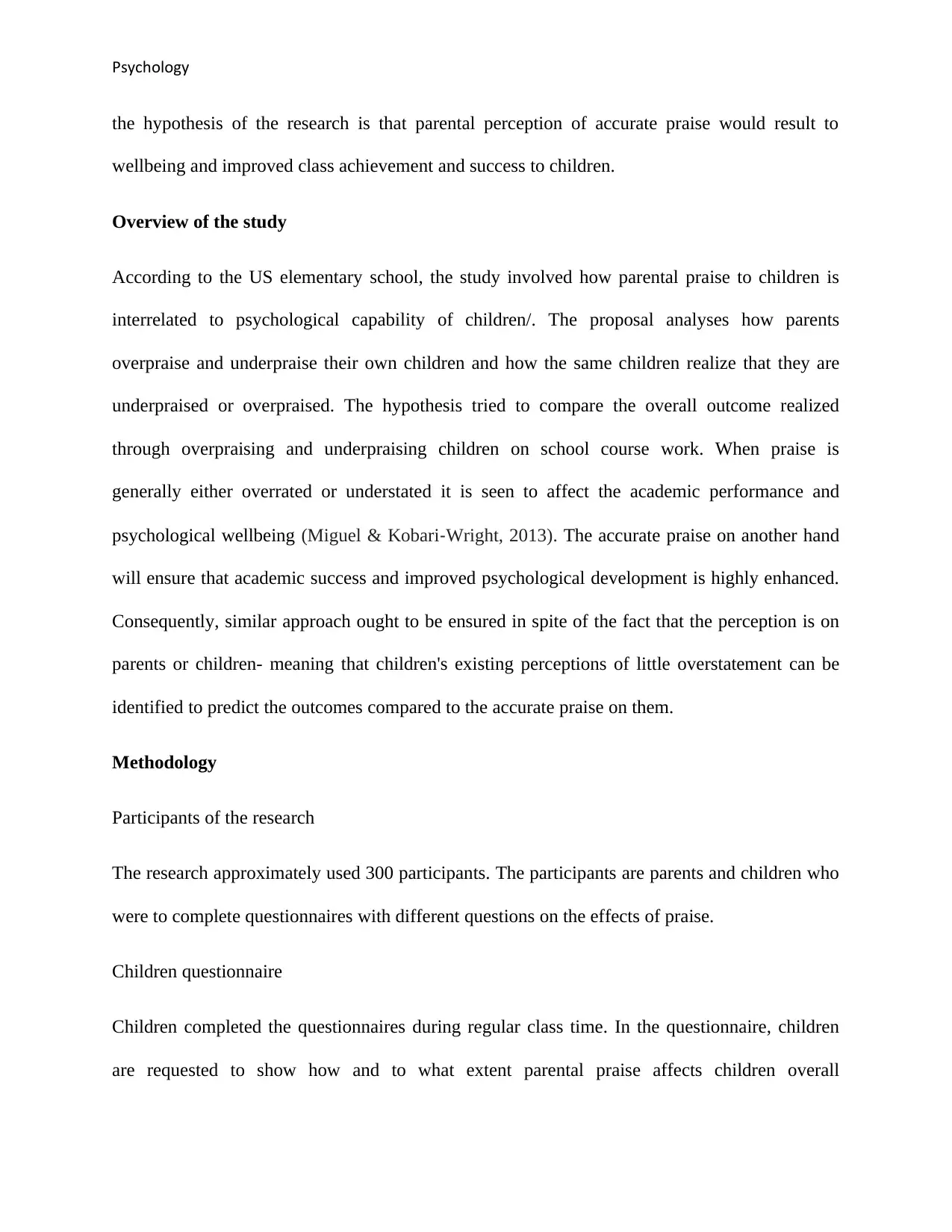
Psychology
the hypothesis of the research is that parental perception of accurate praise would result to
wellbeing and improved class achievement and success to children.
Overview of the study
According to the US elementary school, the study involved how parental praise to children is
interrelated to psychological capability of children/. The proposal analyses how parents
overpraise and underpraise their own children and how the same children realize that they are
underpraised or overpraised. The hypothesis tried to compare the overall outcome realized
through overpraising and underpraising children on school course work. When praise is
generally either overrated or understated it is seen to affect the academic performance and
psychological wellbeing (Miguel & Kobari‐Wright, 2013). The accurate praise on another hand
will ensure that academic success and improved psychological development is highly enhanced.
Consequently, similar approach ought to be ensured in spite of the fact that the perception is on
parents or children- meaning that children's existing perceptions of little overstatement can be
identified to predict the outcomes compared to the accurate praise on them.
Methodology
Participants of the research
The research approximately used 300 participants. The participants are parents and children who
were to complete questionnaires with different questions on the effects of praise.
Children questionnaire
Children completed the questionnaires during regular class time. In the questionnaire, children
are requested to show how and to what extent parental praise affects children overall
the hypothesis of the research is that parental perception of accurate praise would result to
wellbeing and improved class achievement and success to children.
Overview of the study
According to the US elementary school, the study involved how parental praise to children is
interrelated to psychological capability of children/. The proposal analyses how parents
overpraise and underpraise their own children and how the same children realize that they are
underpraised or overpraised. The hypothesis tried to compare the overall outcome realized
through overpraising and underpraising children on school course work. When praise is
generally either overrated or understated it is seen to affect the academic performance and
psychological wellbeing (Miguel & Kobari‐Wright, 2013). The accurate praise on another hand
will ensure that academic success and improved psychological development is highly enhanced.
Consequently, similar approach ought to be ensured in spite of the fact that the perception is on
parents or children- meaning that children's existing perceptions of little overstatement can be
identified to predict the outcomes compared to the accurate praise on them.
Methodology
Participants of the research
The research approximately used 300 participants. The participants are parents and children who
were to complete questionnaires with different questions on the effects of praise.
Children questionnaire
Children completed the questionnaires during regular class time. In the questionnaire, children
are requested to show how and to what extent parental praise affects children overall
⊘ This is a preview!⊘
Do you want full access?
Subscribe today to unlock all pages.

Trusted by 1+ million students worldwide
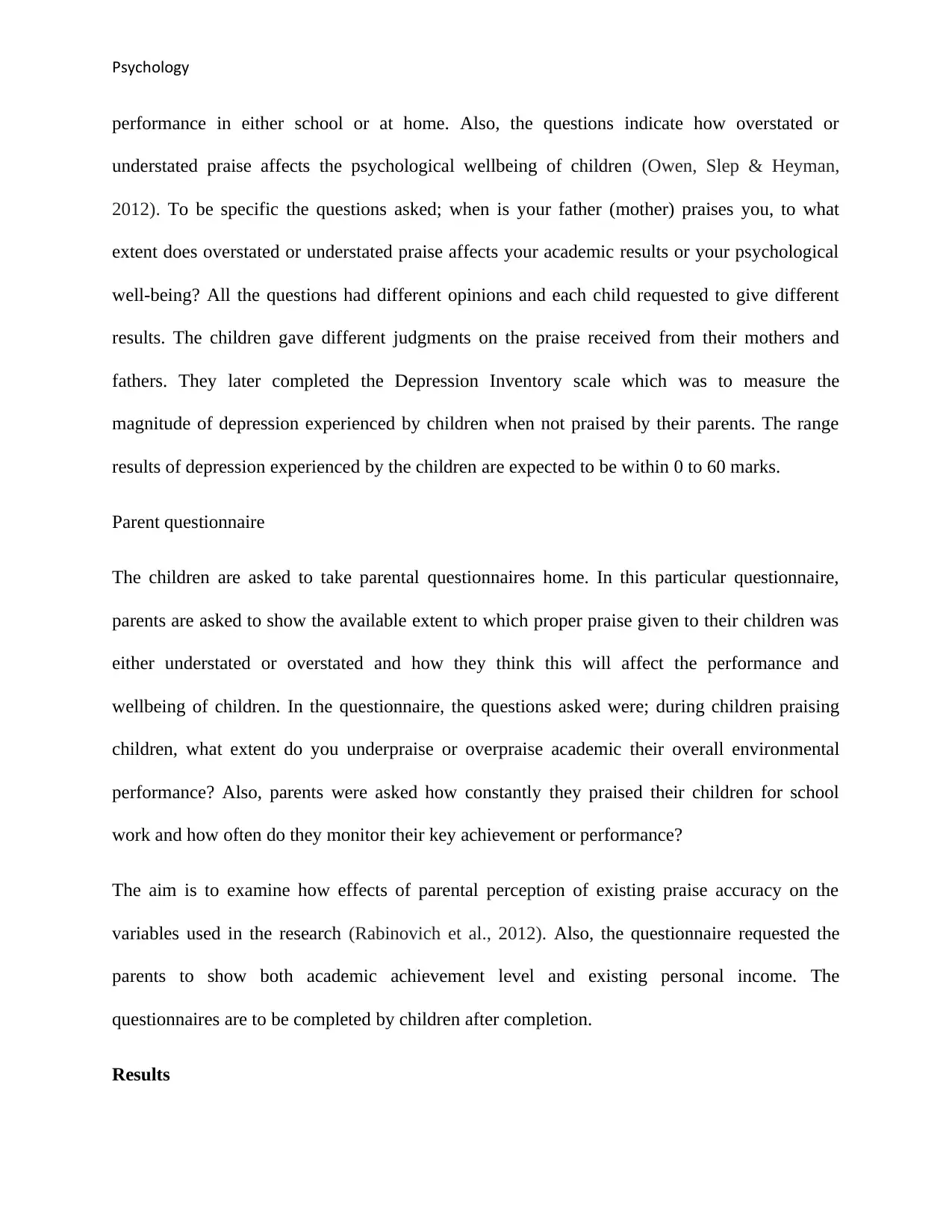
Psychology
performance in either school or at home. Also, the questions indicate how overstated or
understated praise affects the psychological wellbeing of children (Owen, Slep & Heyman,
2012). To be specific the questions asked; when is your father (mother) praises you, to what
extent does overstated or understated praise affects your academic results or your psychological
well-being? All the questions had different opinions and each child requested to give different
results. The children gave different judgments on the praise received from their mothers and
fathers. They later completed the Depression Inventory scale which was to measure the
magnitude of depression experienced by children when not praised by their parents. The range
results of depression experienced by the children are expected to be within 0 to 60 marks.
Parent questionnaire
The children are asked to take parental questionnaires home. In this particular questionnaire,
parents are asked to show the available extent to which proper praise given to their children was
either understated or overstated and how they think this will affect the performance and
wellbeing of children. In the questionnaire, the questions asked were; during children praising
children, what extent do you underpraise or overpraise academic their overall environmental
performance? Also, parents were asked how constantly they praised their children for school
work and how often do they monitor their key achievement or performance?
The aim is to examine how effects of parental perception of existing praise accuracy on the
variables used in the research (Rabinovich et al., 2012). Also, the questionnaire requested the
parents to show both academic achievement level and existing personal income. The
questionnaires are to be completed by children after completion.
Results
performance in either school or at home. Also, the questions indicate how overstated or
understated praise affects the psychological wellbeing of children (Owen, Slep & Heyman,
2012). To be specific the questions asked; when is your father (mother) praises you, to what
extent does overstated or understated praise affects your academic results or your psychological
well-being? All the questions had different opinions and each child requested to give different
results. The children gave different judgments on the praise received from their mothers and
fathers. They later completed the Depression Inventory scale which was to measure the
magnitude of depression experienced by children when not praised by their parents. The range
results of depression experienced by the children are expected to be within 0 to 60 marks.
Parent questionnaire
The children are asked to take parental questionnaires home. In this particular questionnaire,
parents are asked to show the available extent to which proper praise given to their children was
either understated or overstated and how they think this will affect the performance and
wellbeing of children. In the questionnaire, the questions asked were; during children praising
children, what extent do you underpraise or overpraise academic their overall environmental
performance? Also, parents were asked how constantly they praised their children for school
work and how often do they monitor their key achievement or performance?
The aim is to examine how effects of parental perception of existing praise accuracy on the
variables used in the research (Rabinovich et al., 2012). Also, the questionnaire requested the
parents to show both academic achievement level and existing personal income. The
questionnaires are to be completed by children after completion.
Results
Paraphrase This Document
Need a fresh take? Get an instant paraphrase of this document with our AI Paraphraser
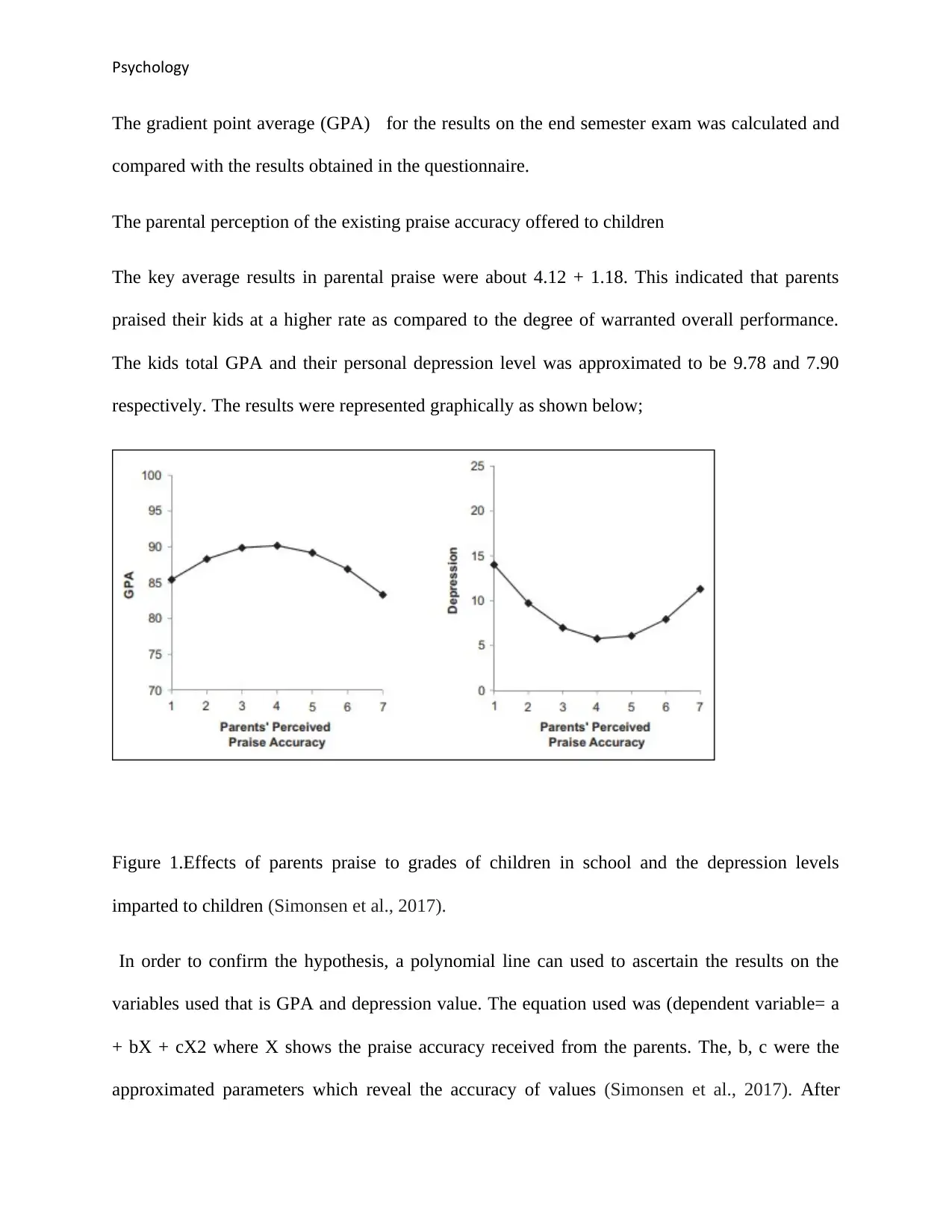
Psychology
The gradient point average (GPA) for the results on the end semester exam was calculated and
compared with the results obtained in the questionnaire.
The parental perception of the existing praise accuracy offered to children
The key average results in parental praise were about 4.12 + 1.18. This indicated that parents
praised their kids at a higher rate as compared to the degree of warranted overall performance.
The kids total GPA and their personal depression level was approximated to be 9.78 and 7.90
respectively. The results were represented graphically as shown below;
Figure 1.Effects of parents praise to grades of children in school and the depression levels
imparted to children (Simonsen et al., 2017).
In order to confirm the hypothesis, a polynomial line can used to ascertain the results on the
variables used that is GPA and depression value. The equation used was (dependent variable= a
+ bX + cX2 where X shows the praise accuracy received from the parents. The, b, c were the
approximated parameters which reveal the accuracy of values (Simonsen et al., 2017). After
The gradient point average (GPA) for the results on the end semester exam was calculated and
compared with the results obtained in the questionnaire.
The parental perception of the existing praise accuracy offered to children
The key average results in parental praise were about 4.12 + 1.18. This indicated that parents
praised their kids at a higher rate as compared to the degree of warranted overall performance.
The kids total GPA and their personal depression level was approximated to be 9.78 and 7.90
respectively. The results were represented graphically as shown below;
Figure 1.Effects of parents praise to grades of children in school and the depression levels
imparted to children (Simonsen et al., 2017).
In order to confirm the hypothesis, a polynomial line can used to ascertain the results on the
variables used that is GPA and depression value. The equation used was (dependent variable= a
+ bX + cX2 where X shows the praise accuracy received from the parents. The, b, c were the
approximated parameters which reveal the accuracy of values (Simonsen et al., 2017). After
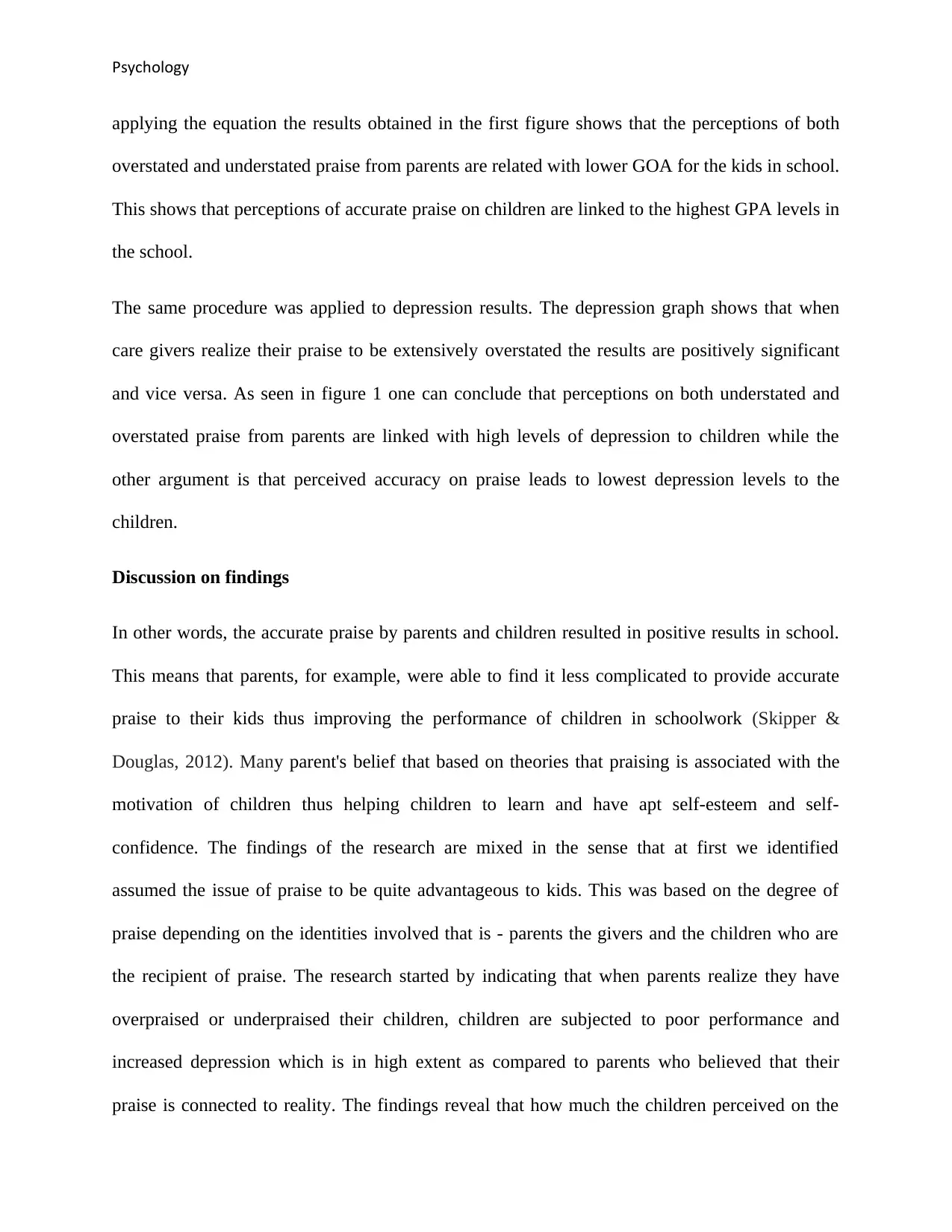
Psychology
applying the equation the results obtained in the first figure shows that the perceptions of both
overstated and understated praise from parents are related with lower GOA for the kids in school.
This shows that perceptions of accurate praise on children are linked to the highest GPA levels in
the school.
The same procedure was applied to depression results. The depression graph shows that when
care givers realize their praise to be extensively overstated the results are positively significant
and vice versa. As seen in figure 1 one can conclude that perceptions on both understated and
overstated praise from parents are linked with high levels of depression to children while the
other argument is that perceived accuracy on praise leads to lowest depression levels to the
children.
Discussion on findings
In other words, the accurate praise by parents and children resulted in positive results in school.
This means that parents, for example, were able to find it less complicated to provide accurate
praise to their kids thus improving the performance of children in schoolwork (Skipper &
Douglas, 2012). Many parent's belief that based on theories that praising is associated with the
motivation of children thus helping children to learn and have apt self-esteem and self-
confidence. The findings of the research are mixed in the sense that at first we identified
assumed the issue of praise to be quite advantageous to kids. This was based on the degree of
praise depending on the identities involved that is - parents the givers and the children who are
the recipient of praise. The research started by indicating that when parents realize they have
overpraised or underpraised their children, children are subjected to poor performance and
increased depression which is in high extent as compared to parents who believed that their
praise is connected to reality. The findings reveal that how much the children perceived on the
applying the equation the results obtained in the first figure shows that the perceptions of both
overstated and understated praise from parents are related with lower GOA for the kids in school.
This shows that perceptions of accurate praise on children are linked to the highest GPA levels in
the school.
The same procedure was applied to depression results. The depression graph shows that when
care givers realize their praise to be extensively overstated the results are positively significant
and vice versa. As seen in figure 1 one can conclude that perceptions on both understated and
overstated praise from parents are linked with high levels of depression to children while the
other argument is that perceived accuracy on praise leads to lowest depression levels to the
children.
Discussion on findings
In other words, the accurate praise by parents and children resulted in positive results in school.
This means that parents, for example, were able to find it less complicated to provide accurate
praise to their kids thus improving the performance of children in schoolwork (Skipper &
Douglas, 2012). Many parent's belief that based on theories that praising is associated with the
motivation of children thus helping children to learn and have apt self-esteem and self-
confidence. The findings of the research are mixed in the sense that at first we identified
assumed the issue of praise to be quite advantageous to kids. This was based on the degree of
praise depending on the identities involved that is - parents the givers and the children who are
the recipient of praise. The research started by indicating that when parents realize they have
overpraised or underpraised their children, children are subjected to poor performance and
increased depression which is in high extent as compared to parents who believed that their
praise is connected to reality. The findings reveal that how much the children perceived on the
⊘ This is a preview!⊘
Do you want full access?
Subscribe today to unlock all pages.

Trusted by 1+ million students worldwide
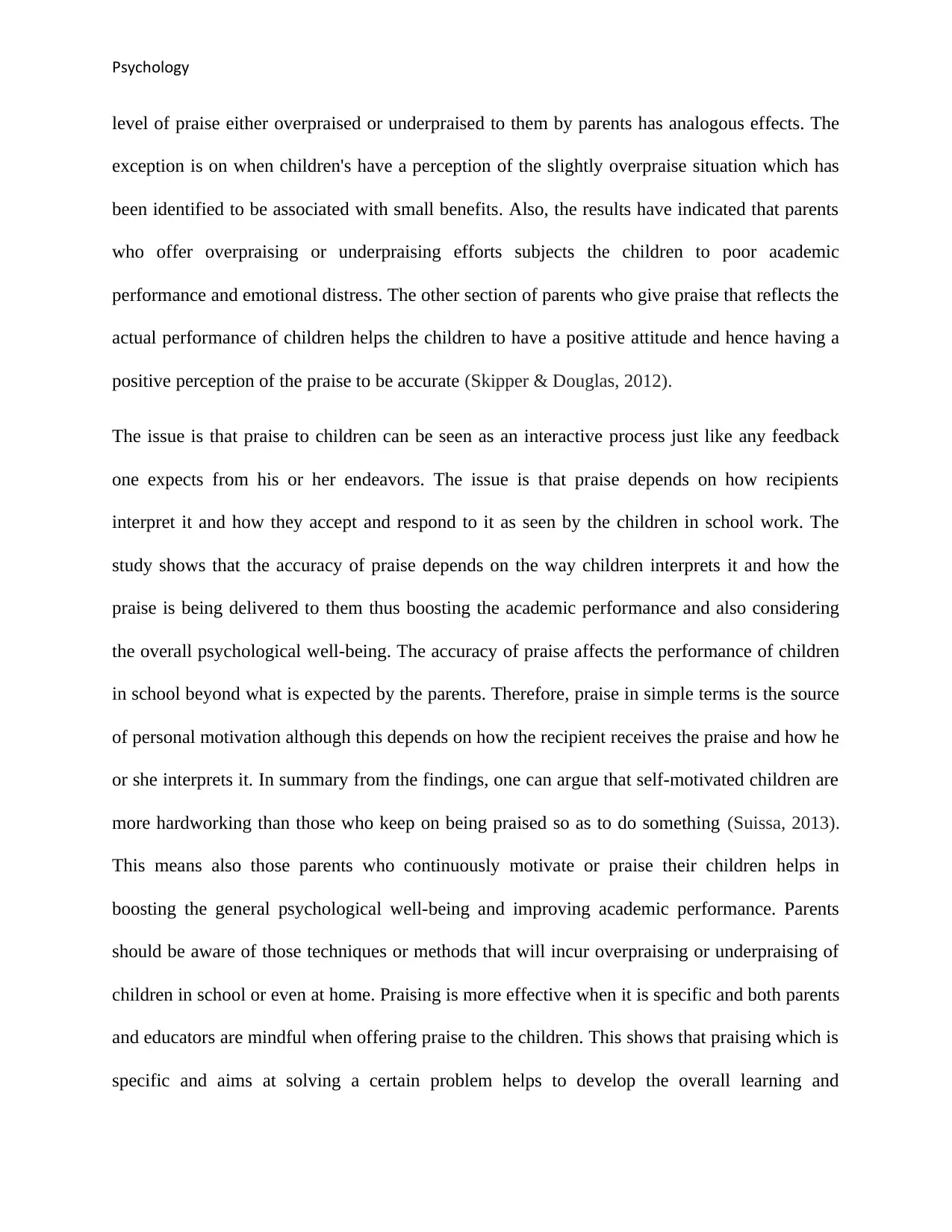
Psychology
level of praise either overpraised or underpraised to them by parents has analogous effects. The
exception is on when children's have a perception of the slightly overpraise situation which has
been identified to be associated with small benefits. Also, the results have indicated that parents
who offer overpraising or underpraising efforts subjects the children to poor academic
performance and emotional distress. The other section of parents who give praise that reflects the
actual performance of children helps the children to have a positive attitude and hence having a
positive perception of the praise to be accurate (Skipper & Douglas, 2012).
The issue is that praise to children can be seen as an interactive process just like any feedback
one expects from his or her endeavors. The issue is that praise depends on how recipients
interpret it and how they accept and respond to it as seen by the children in school work. The
study shows that the accuracy of praise depends on the way children interprets it and how the
praise is being delivered to them thus boosting the academic performance and also considering
the overall psychological well-being. The accuracy of praise affects the performance of children
in school beyond what is expected by the parents. Therefore, praise in simple terms is the source
of personal motivation although this depends on how the recipient receives the praise and how he
or she interprets it. In summary from the findings, one can argue that self-motivated children are
more hardworking than those who keep on being praised so as to do something (Suissa, 2013).
This means also those parents who continuously motivate or praise their children helps in
boosting the general psychological well-being and improving academic performance. Parents
should be aware of those techniques or methods that will incur overpraising or underpraising of
children in school or even at home. Praising is more effective when it is specific and both parents
and educators are mindful when offering praise to the children. This shows that praising which is
specific and aims at solving a certain problem helps to develop the overall learning and
level of praise either overpraised or underpraised to them by parents has analogous effects. The
exception is on when children's have a perception of the slightly overpraise situation which has
been identified to be associated with small benefits. Also, the results have indicated that parents
who offer overpraising or underpraising efforts subjects the children to poor academic
performance and emotional distress. The other section of parents who give praise that reflects the
actual performance of children helps the children to have a positive attitude and hence having a
positive perception of the praise to be accurate (Skipper & Douglas, 2012).
The issue is that praise to children can be seen as an interactive process just like any feedback
one expects from his or her endeavors. The issue is that praise depends on how recipients
interpret it and how they accept and respond to it as seen by the children in school work. The
study shows that the accuracy of praise depends on the way children interprets it and how the
praise is being delivered to them thus boosting the academic performance and also considering
the overall psychological well-being. The accuracy of praise affects the performance of children
in school beyond what is expected by the parents. Therefore, praise in simple terms is the source
of personal motivation although this depends on how the recipient receives the praise and how he
or she interprets it. In summary from the findings, one can argue that self-motivated children are
more hardworking than those who keep on being praised so as to do something (Suissa, 2013).
This means also those parents who continuously motivate or praise their children helps in
boosting the general psychological well-being and improving academic performance. Parents
should be aware of those techniques or methods that will incur overpraising or underpraising of
children in school or even at home. Praising is more effective when it is specific and both parents
and educators are mindful when offering praise to the children. This shows that praising which is
specific and aims at solving a certain problem helps to develop the overall learning and
Paraphrase This Document
Need a fresh take? Get an instant paraphrase of this document with our AI Paraphraser
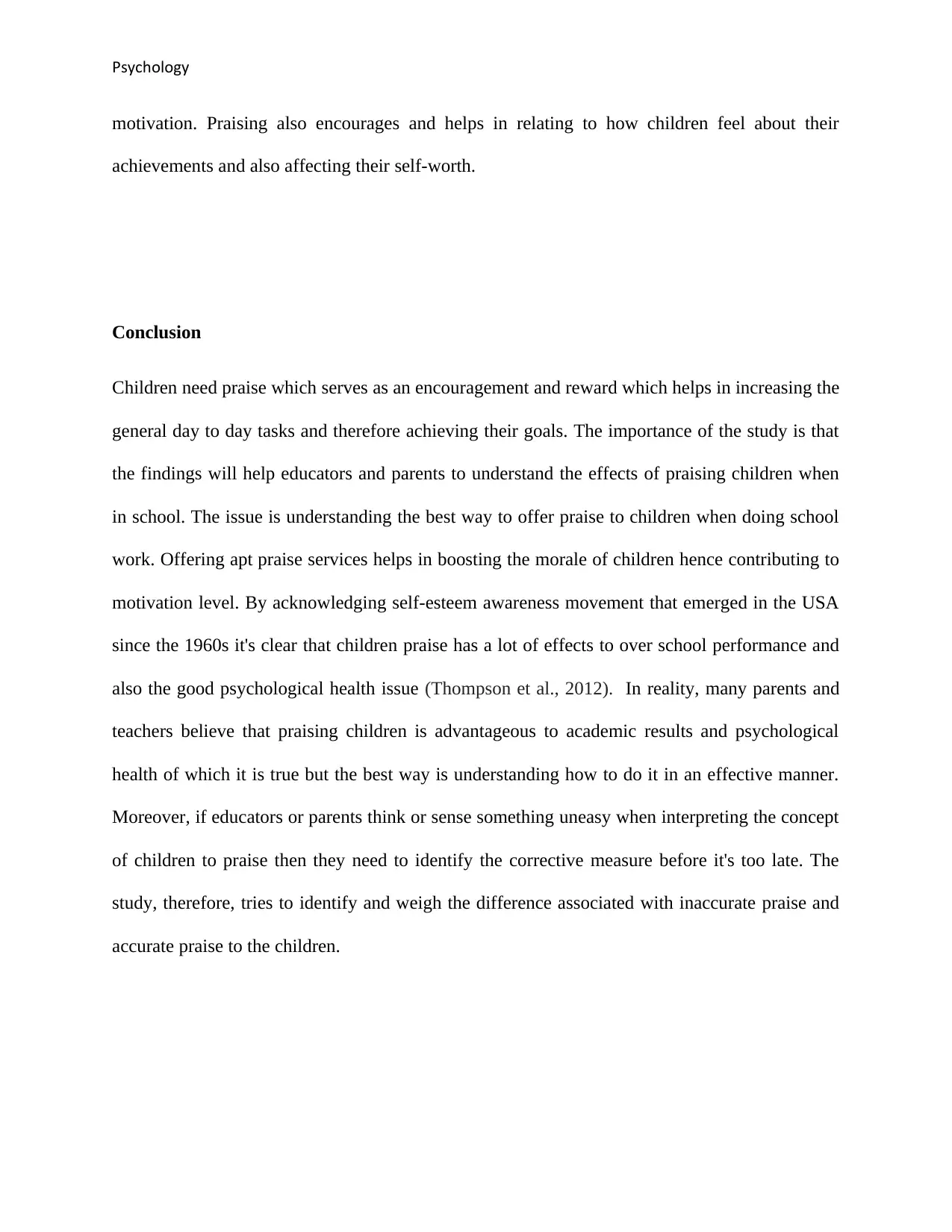
Psychology
motivation. Praising also encourages and helps in relating to how children feel about their
achievements and also affecting their self-worth.
Conclusion
Children need praise which serves as an encouragement and reward which helps in increasing the
general day to day tasks and therefore achieving their goals. The importance of the study is that
the findings will help educators and parents to understand the effects of praising children when
in school. The issue is understanding the best way to offer praise to children when doing school
work. Offering apt praise services helps in boosting the morale of children hence contributing to
motivation level. By acknowledging self-esteem awareness movement that emerged in the USA
since the 1960s it's clear that children praise has a lot of effects to over school performance and
also the good psychological health issue (Thompson et al., 2012). In reality, many parents and
teachers believe that praising children is advantageous to academic results and psychological
health of which it is true but the best way is understanding how to do it in an effective manner.
Moreover, if educators or parents think or sense something uneasy when interpreting the concept
of children to praise then they need to identify the corrective measure before it's too late. The
study, therefore, tries to identify and weigh the difference associated with inaccurate praise and
accurate praise to the children.
motivation. Praising also encourages and helps in relating to how children feel about their
achievements and also affecting their self-worth.
Conclusion
Children need praise which serves as an encouragement and reward which helps in increasing the
general day to day tasks and therefore achieving their goals. The importance of the study is that
the findings will help educators and parents to understand the effects of praising children when
in school. The issue is understanding the best way to offer praise to children when doing school
work. Offering apt praise services helps in boosting the morale of children hence contributing to
motivation level. By acknowledging self-esteem awareness movement that emerged in the USA
since the 1960s it's clear that children praise has a lot of effects to over school performance and
also the good psychological health issue (Thompson et al., 2012). In reality, many parents and
teachers believe that praising children is advantageous to academic results and psychological
health of which it is true but the best way is understanding how to do it in an effective manner.
Moreover, if educators or parents think or sense something uneasy when interpreting the concept
of children to praise then they need to identify the corrective measure before it's too late. The
study, therefore, tries to identify and weigh the difference associated with inaccurate praise and
accurate praise to the children.
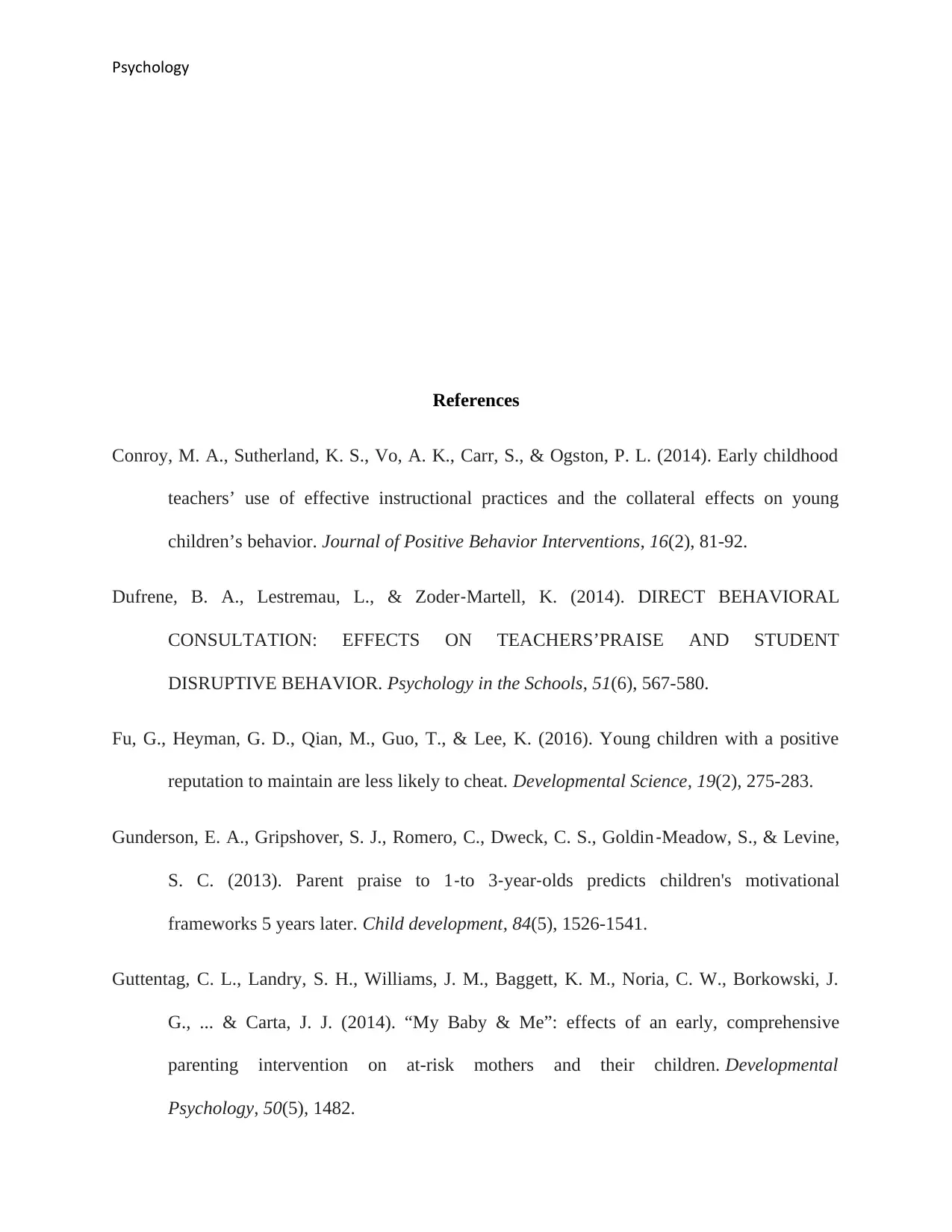
Psychology
References
Conroy, M. A., Sutherland, K. S., Vo, A. K., Carr, S., & Ogston, P. L. (2014). Early childhood
teachers’ use of effective instructional practices and the collateral effects on young
children’s behavior. Journal of Positive Behavior Interventions, 16(2), 81-92.
Dufrene, B. A., Lestremau, L., & Zoder‐Martell, K. (2014). DIRECT BEHAVIORAL
CONSULTATION: EFFECTS ON TEACHERS’PRAISE AND STUDENT
DISRUPTIVE BEHAVIOR. Psychology in the Schools, 51(6), 567-580.
Fu, G., Heyman, G. D., Qian, M., Guo, T., & Lee, K. (2016). Young children with a positive
reputation to maintain are less likely to cheat. Developmental Science, 19(2), 275-283.
Gunderson, E. A., Gripshover, S. J., Romero, C., Dweck, C. S., Goldin‐Meadow, S., & Levine,
S. C. (2013). Parent praise to 1‐to 3‐year‐olds predicts children's motivational
frameworks 5 years later. Child development, 84(5), 1526-1541.
Guttentag, C. L., Landry, S. H., Williams, J. M., Baggett, K. M., Noria, C. W., Borkowski, J.
G., ... & Carta, J. J. (2014). “My Baby & Me”: effects of an early, comprehensive
parenting intervention on at-risk mothers and their children. Developmental
Psychology, 50(5), 1482.
References
Conroy, M. A., Sutherland, K. S., Vo, A. K., Carr, S., & Ogston, P. L. (2014). Early childhood
teachers’ use of effective instructional practices and the collateral effects on young
children’s behavior. Journal of Positive Behavior Interventions, 16(2), 81-92.
Dufrene, B. A., Lestremau, L., & Zoder‐Martell, K. (2014). DIRECT BEHAVIORAL
CONSULTATION: EFFECTS ON TEACHERS’PRAISE AND STUDENT
DISRUPTIVE BEHAVIOR. Psychology in the Schools, 51(6), 567-580.
Fu, G., Heyman, G. D., Qian, M., Guo, T., & Lee, K. (2016). Young children with a positive
reputation to maintain are less likely to cheat. Developmental Science, 19(2), 275-283.
Gunderson, E. A., Gripshover, S. J., Romero, C., Dweck, C. S., Goldin‐Meadow, S., & Levine,
S. C. (2013). Parent praise to 1‐to 3‐year‐olds predicts children's motivational
frameworks 5 years later. Child development, 84(5), 1526-1541.
Guttentag, C. L., Landry, S. H., Williams, J. M., Baggett, K. M., Noria, C. W., Borkowski, J.
G., ... & Carta, J. J. (2014). “My Baby & Me”: effects of an early, comprehensive
parenting intervention on at-risk mothers and their children. Developmental
Psychology, 50(5), 1482.
⊘ This is a preview!⊘
Do you want full access?
Subscribe today to unlock all pages.

Trusted by 1+ million students worldwide
1 out of 14
Related Documents
Your All-in-One AI-Powered Toolkit for Academic Success.
+13062052269
info@desklib.com
Available 24*7 on WhatsApp / Email
![[object Object]](/_next/static/media/star-bottom.7253800d.svg)
Unlock your academic potential
Copyright © 2020–2026 A2Z Services. All Rights Reserved. Developed and managed by ZUCOL.





